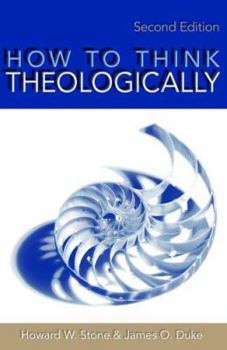How to Think Theologically
Select Format
Select Condition 
Book Overview
For over fifteen years, How to Think Theologically has served as the ideal primer on the work of theology for students at all levels of study. Stone and Duke contend that theology is not an optional,... This description may be from another edition of this product.
Format:Paperback
Language:English
ISBN:0800638182
ISBN13:9780800638184
Release Date:January 2006
Publisher:Fortress Press
Length:142 Pages
Weight:0.50 lbs.
Dimensions:0.4" x 5.5" x 8.5"
Customer Reviews
5 ratings
!
Published by Thriftbooks.com User , 15 years ago
Book arrived in stated condition and prior to est. arrival date. An excellent companion and possibly lead book with and for The Art of Theological Reflection by Killen/de Beer.
A thorough, clear introduction to theological reflection
Published by Thriftbooks.com User , 16 years ago
Stone and Duke have produced an excellent introduction to theological reflection here. This book is very readable and doesn't sacrifice scholarship in order to be so. They have organized the book well, giving it a natural flow and progression from one topic to the next. They truly leave no major stone unturned in this volume. Highly recommended as a great starting point for reading about theological reflection.
And It Was Painless!!
Published by Thriftbooks.com User , 18 years ago
Whenever it comes to reading books on Theology or books written by Theologians I simply reach out and take 2 aspirins as a pre-emptive move. It just simply hurts to both understand these scholars and to realize how little I know. This book on the other hand is written in a non-threatening way as a sensitive scholar may speak to his eager to learn but scared students. After reading this book I actually felt confident enough to begin sorting out my faith on my own and not simply rely on commentaries. In the process Theology became real, vibrant and even up lifting as I applied the results of this book. Now don't get me wrong. I had to re-read some chapters to get it all but that was because I wanted to get it all and not because it was written in "high english". The authors actually made me feel that I wanted to get it and that I could get it. I especially liked the explanation of sequential thinking vs. parallel synthetic thinking on page 60. This helped me understand how and why I think the way I do. Another great aspect of this book is that it only 125 pages long which put me at ease when I sat down to read a book on theology that wasn't 500 pages long. The authors get to the point and have to be clear about it if they want to make a small book a success. And they did!!!
Very thoughtful
Published by Thriftbooks.com User , 21 years ago
'How to Think Theologically' by Howard Stone and James Duke is a wonderfully accessible text, not about any particular school of theology, but rather, how to think theologically within almost any framework. While there are certainly some theological settings that prefer to go unquestioned and resist critical reflection, many are open to the kinds of reflection and critical analysis Stone and Duke describe here.Perhaps the most important concept in the entire text come early in the text, and that is the concept of embedded versus deliberative theology. Embedded theology is that kind of theological content that is in us without our necessarily being aware of it. Embedded theology can come from early childhood ideas of God, Jesus, etc. Embedded theology can come from hymn texts, prayers, and sermons that reinforce ideas. Embedded theology can come from family, friends and neighbours. These are influences, subtle and explicit, that form a theological mindset in a person about just who and what God is, what God wants, what the church and community expects, etc.Those churches and theological communities that resist critical analysis and reflection stand on shaky ground. They discourage questioning, often appealing to the ultimate source ('Who are you to question God?') when such arise. What is sometimes missed is that it is not God who is being questioned (not that there is necessarily anything wrong with that, given the number of times in the Bible examples of God being questioned and bargained with are presented), but rather an individual's or community's preconceptions of God that are being questioned.This gets into deliberative theology. Deliberative theology is a second-order process, of asking important questions about who, what, when, where, how and why. Not all questions can be answered. Not all will be relevant. Sometimes, deliberative theology will serve to strengthen the embedded theological ideas; sometimes, deliberative processes will cause a reconstruction and reconception. Stone and Duke look at the different types of questions to be asked, and what to do with answers, as well as how to deal with ambiguities and inconsistencies. This book is not one that brings theological thinking to a conclusion, but rather is a starting point. It is often used in seminaries as a beginning to theological reflection, either in introductory classes or systematic theology classes (as is being done in my seminary this year). It is also worthwhile reading for anyone who wishes to have a stronger foundation upon which to build the faith of a community, so that honest questions can be dealt with in an honest fashion, rather than ignored or discouraged.
Excellent "Primer" on basic theological issues and methods
Published by Thriftbooks.com User , 27 years ago
Stone and Duke have an excellent style of writing. They make you feel as if you are sitting with them around a comfortable table having a late evening discussion over a hot cup of coffee. Their real world examples bring their theological concepts into crystal clear focus and assists the reader in transforming external theological principles into interalized spiritual practices






